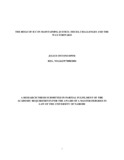| dc.description.abstract | The establishment of a permanent international criminal court in 2002, whose main role is to try perpetrators of international crimes, was seen as an innovative step towards the realization of justice. The International Criminal Court (ICC) was meant to end impunity through prosecution of perpetrators of atrocities. ICC unlike the earlier tribunals preceding it adopted both the retributive and restorative approach to justice. In adopting restorative approach, ICC introduced victims‟ participation in its proceedings and reparation to victims. As at the end of year 2016, ICC has been able to carry out ten investigations, ten preliminary investigations, five ongoing trialsandfinalized five cases. Despite the aforesaid successes, ICC faces several challenges both inherent in the Rome Statute and external. The Court has limited jurisdiction in material crimes, time, admissibility and complementarities. It has no jurisdiction over non-State Parties unless they voluntarily acknowledge its jurisdiction or the United Nation Security Council (UNSC) refers the state‟s situationto the Court. It has to relay on States‟ cooperation to conduct investigations and enforce its decisions but in many instances this has been wanting.Non-State cooperation appears to be the major challenge which has hindered its mandate. Interpretation of the right to victims‟ participation and reparation are also problematic as they are not clearly defined in the Rome Statute and as such are left to the discretion of the trial Chamber. Since its establishment, ICC has only handled one reparation case in the Lubanga case which also took long to decide.
Ironically, the world is experiencing more internal conflicts and wars since the establishment of the ICC. The Syrian war is on such situation which the United Nations (UN) has recognized as war crimes and crimesagainst humanity but due to the jurisdictional limitations, the ICC may not be able to act. Similarly, the Court may not be able toinvestigate a number of situations even
x
when international crimes are apparent due to jurisdictional challenges. This calls for alternative measure to supplementthe efforts of the ICC in maintaining justice. Due to the inherent challenges facing the ICC and the complementarity principle, national states are encouraged to establish credible national criminal processes to prosecute international crimes occurring within their jurisdictions and provide reparation to victims. However, national prosecutions face their own challenges such inadequate infrastructure, capacity, lack of political will and non-cooperation from state actors. In order to address these challenges ICC has been requested to provide assistance and capacity building at national levels and also to strengthen its relationship with national States. This study analyses the role of the ICC in maintaining global justice. It identifies the key challenges facing ICC in its objective of maintaining universal justiceand suggests possible solutions to those challenges. | en_US |



